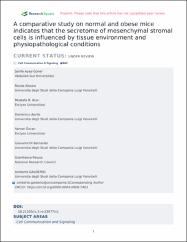A comparative study on normal and obese mice indicates that the secretome of mesenchymal stromal cells is influenced by tissue environment and physiopathological conditions

View/
Access
info:eu-repo/semantics/openAccessDate
2020Author
Ayaz-Guner, SerifeAlessio, Nicola
Acar, Mustafa B.
Aprile, Domenico
Ozcan, Servet
Di Bernardo, Giovanni
Peluso, Gianfranco
Galderisi, Umberto
Metadata
Show full item recordAbstract
Background: The term mesenchymal stromal cells (MSCs) designates an assorted cell population comprised of stem cells, progenitor cells, fibroblasts, and stromal cells. MSCs contribute to the homeostatic maintenance of many organs through paracrine and long-distance signaling. Tissue environment, in both physiological and pathological conditions, may affect the intercellular communication of MSCs.
Methods: We performed a secretome analysis of MSCs isolated from subcutaneous adipose tissue (sWAT) and visceral adipose tissue (vWAT), and from bone marrow (BM), of normal and obese mice.
Results: The MSCs isolated from tissues of healthy mice share a common core of released factors: components of cytoskeletal and extracellular structures; regulators of basic cellular functions, such as protein synthesis and degradation; modulators of endoplasmic reticulum stress; and counteracting oxidative stress. It can be hypothesized that MSC secretome beneficially affects target cells by the horizontal transfer of many released factors. Each type of MSC may exert specific signaling functions, which could be determined by looking at the many factors that are exclusively released from every MSC type.
The vWAT-MSCs release factors that play a role in detoxification activity in response to toxic substances and drugs. The sWAT-MSC secretome contains proteins involved in in chondrogenesis, osteogenesis, and angiogenesis. Analysis of BM-MSC secretome revealed that these cells exert a signaling function by remodeling extracellular matrix structures, such as those containing glycosaminoglycans. Obesity status profoundly modified the secretome content of MSCs, impairing the above-described activity and promoting the release of inflammatory factors.
Conclusion: We demonstrated that the content of MSC secretomes depends on tissue microenvironment and that pathological condition may profoundly alter its composition.

















